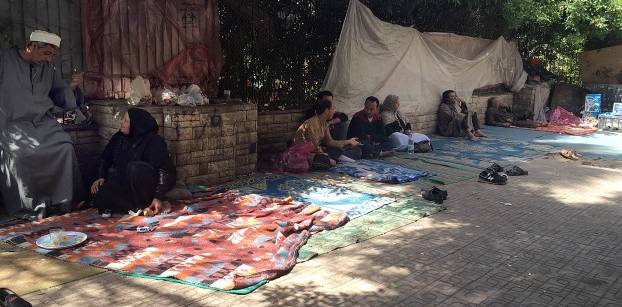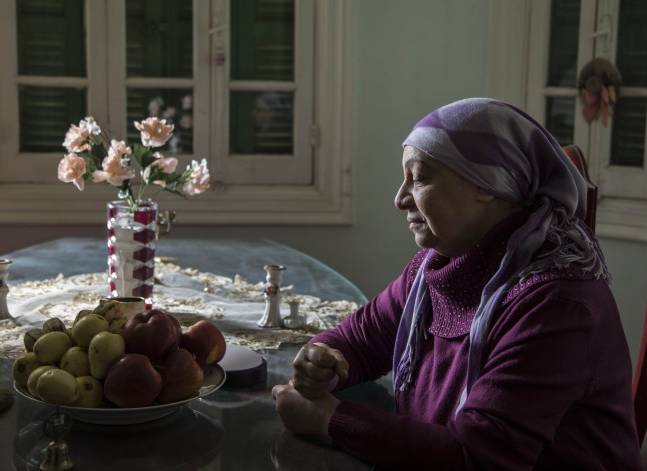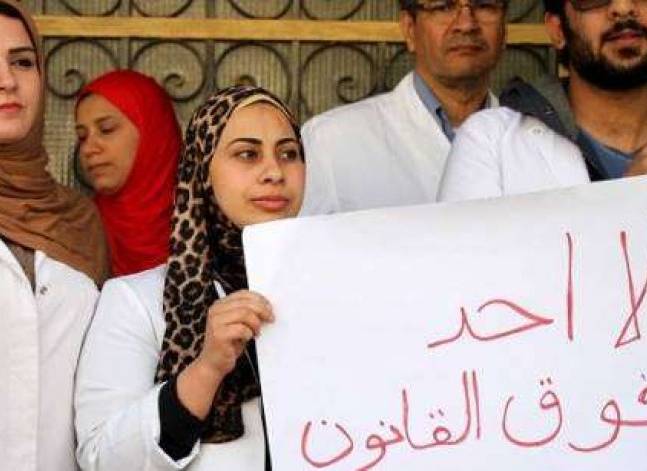Latest NEWS
- Aswat Masriya, the last word
- Roundup of Egypt's press headlines on March 15, 2017
- Roundup of Egypt's press headlines on March 14, 2017
- Former Egyptian President Hosni Mubarak to be released: lawyer
- Roundup of Egypt's press headlines on March 13, 2017
- Egypt's capital set to grow by half a million in 2017
- Egypt's wheat reserves to double with start of harvest -supply min
- Roundup of Egypt's press headlines on March 12, 2017
'Clinical Trials': sanctuary for those unable to cover their medical expenses in Egypt (Part 2*)
CAIRO, Jul 14 (Aswat Masriya) - There was not much discussion concerning a law regulating clinical trials. In 2002, Dr. Hossam Badrawy, Professor in Faculty of Medicine at Kasr Al-Ainy, submitted to the parliament a draft of a law concerning pharmacological studies in Egypt.
The parliament held many discussions on this law, yet it was rejected. In 2012, the clinical trials draft law was announced, but it was later suspended to be reformed after being refuted by many researchers.
The importance of issuing a law for clinical trials
Dr. Imam Waked, Director of the Clinical Research Unit at Menoufia LI, said, "Outside the current framework, anyone can run a clinical trial, invent a drug or illegally smuggle it inside Egypt," and stressed on the importance of setting a law as a deterrent for those who violate the trials’ rules.
Waked said that the previously announced draft law in 2014 triggered the anger of many researchers. The law included articles that set penalties on the researchers up to imprisonment.
Informed consent form
Informed consent is the contract that the patient signs which includes all the details concerning the experiment and the patient’s rights.
Dr. Noha Abdul Raziq, a pharmacist doctor who works in the Clinical Research Centre, Oncology Dept. at Kasr al-Aini Hospital stated, "We give the patient time to think prior to signing the form, usually 15-28 days before the trial. We try to explain all possible side-effects of the drug."
The informed consent form further "explains the right to withdraw from the trial and the right to receive treatment after withdrawal; in addition to the provision of travel allowances, if the patient is not a resident of Cairo."
Dr. Muhammad Ali Khalil, Coordinator of the Commission for Defending the Right to Health, added that the informed consent of the volunteer is meaningless given the high rates of poverty in Egypt. "Therefore, we find people who would be willing to get paid in exchange for their blood, organs, or for the sake of running experiments," Khalil said.
"Moreover, a universal health insurance system covering all Egyptians is lacking, which prompts patients to accept to be part of a pharmacological trial, just to access any medicine instead of being denied treatment," Khalid added.
Most famous clinical trials scandals
Dr. Majd Qotb, Pediatrics Professor at Al-Kasr al-Aini, revealed a very dramatic incident that has been put before the prosecution since 2008.
"I filed a report against a clinical trial conducted on some children in one of Cairo University’s hospitals. I proved with documents that among 734 children that were being treated for having cholestasis, 401 children were given a drug containing 'ursodeoxycholic' acid," Dr. Qotb said.
"Only 9.35 per cent of them were cured, whereas 86.54% suffered a setback; hepatic failure and abdominal ascites. As a consequence, the death rate increased in addition to complications of abdominal ascites, deadly pneumonia, and otitis media.” Dr. Quotb added.
According to Dr. Qotb, Dr. Nashwa Badawi’s Masters thesis has proved the ineffectiveness of this drug in treating those children, on the contrary it proved its harmfulness. "The research findings showed that only 35 per cent responded to this drug, whereas 65 per cent did not. As a consequence, those children suffered liver failure,” Qotb said.
Dr. Qotb then clarified that the drug’s name is Ursofalk, produced by a German company called "Halk", and that this company vanished from the scene after the failure of the experiment.
Dr. Alaa Awad, Professor of hepatic diseases at Theodor Bilharz Research Institute said, "There is no legislation compelling pharmaceutical companies to announce the results of trials, or make public the failure of such trials."
Intermediate companies
In some cases, pharmaceutical companies use "intermediate companies" or "Contract research companies" to follow up on the trials.
Dr. Alaa Awad was somewhat conservative concerning intermediate companies.
"There is no legislative framework governing the execution of pharmacological experimentation by companies, that is to say establishing mandates, funding, control procedures, and monitoring. Thus, the operations conducted by drug companies in Egypt nowadays are rather suspicious," Awad said.
"Quintiles" is considered one of the most famous intermediate companies for conducting clinical trials. We contacted one of the former employees in the company who asked to stay anonymous. The employee said that about 15 companies like Quintiles are legally working in Egypt.
Any company intending to operate in Egypt must register with the Egyptian Ministry of Health (MoH) and must provide a registration dossier with the key documents related to the company and its operations in Egypt as well as its global affiliation.
The Quintiles employee referred to the fact that the Ministry of Health monitors and evaluates the company.
Security clearance
Usually, foreign pharmaceutical companies test their drugs in more than one country at the same time, and at the end of the study they collect blood and tissue samples from the participant countries and test them in one central laboratory. However, sending the sample outside Egypt requires a security clearance, which has become so difficult to obtain since 2014 according to researchers.
Speaking about challenges, Dr. Waked said, "No new clinical trials are conducted on HCV patients because of security approvals, and most of the imported medications will not be tested in Egypt due to the difficulty of sending samples abroad."
Concerning the inflexibility in sending samples for testing abroad, Dr. Manal Hamdy el-Sayyed, professor of Pediatrics, said that the only case where Egypt could refuse this procedure is by having a true pharmaceutical industry starting from the discovery of the active ingredient down to manufacturing, rather than limiting it to packaging only.
Experiments in private clinics
Conducting clinical trials in private clinics was allowed until 2008 when the Ministry of Health issued a decree banning such practice.
Dr. Hamdy Abdul Azim, Oncologist, and former head of the Department of Oncology in the Faculty of Medicine, Cairo University expressed his views concerning the draft law governing clinical trials saying, "I support trials in private clinics and I conducted trials in my own clinic and stopped in 2008 by virtue of a decision issued by Dr. Nadia Ragab, the Chair of MoH’s Research Ethics Committee at the time.”
Egypt is a country that attracts clinical trials
Egypt comes in the second place after South Africa as the most welcoming country for conducting clinical trials.
Dr. Hani Selim, member of the Research Ethics Committee, the Faculty of Medicine, said that Egypt attracts trials because it is densely populated and harbors many researchers, universities and research centers; moreover, it is a significant market for the consumption of drugs.
Dr. Wahid Doss, LI Dean, and member of the Supreme Committee for Hepatic Viruses, confirmed that Egypt benefits from clinical trials, and that some drugs are convenient for the Hepatitis C (HCV), as the gene of the virus found in Egypt is different from that found in other countries around the world.
Choosing the patients
Concerning the technique of selecting the patients participating in the trial, Dr. Magdi el-Sairafi, LI director and member of the Supreme Committee for Hepatic Viruses, stated that upon selection of patients, preference is given to a "moderate" case, preferably a young man, not suffering from any chronic diseases, and not a recipient of any former treatment.
Files disappearing from the Cancer Institute (CI)
In July 2015, some newspapers published that Dr. Ghada al-Sherif, the chair of the Statistics Department in the National Cancer Institute, discovered the disappearance of 1,000 medical files. These files included details on the health conditions, types of medications, response to treatment, and all personal data of patients.
Dr. al-Sherif refused to make any statement on the incident, and she maintained that she filed a report to the prosecutor.
Ali Taha, the attorney hired by Dr. al-Sherif, stated that he filed a report to the public prosecutor on behalf of the Chair of the Medical Statistics Department of the CI.
After the incident was disclosed, Cairo University created an ad-hoc committee for investigation. On 27 July 2015, the investigation was closed.
On 21 September, 2015, the program titled "Key of Life", aired on al-Hayah satellite channel, revealed that the files lost from CI were found in a dumpster in Tahrir St. in Dokki neighborhood, Downtown Cairo.
Liver medicine for children experiments
Dr. Manal Hamdy al-Sayyed, professor of Pediatrics and member of the Supreme Committee for Hepatic Viruses, was really worried about the absence of experiments of new liver drugs on children, calling on pharmaceutical companies to give more attention to this subject in every medical conference.
"Pharmaceutical companies would not focus on trials for pediatric drugs and would not manufacture such drugs before ensuring a market, which is what calls for international pressure to satisfy humanistic purposes," al-Sayed said.
Dr. al-Sayyed added, "I struggle all the time internationally to have clinical trials approved for pediatrics hepatic drugs that enable their early treatment. However, pharmaceutical companies would probably end their trials on children by the year 2018. New and better drugs could emerge and children would be deprived from them. Egypt alone accounts for 10 per cent of the sick children worldwide, under the age of 15."
Al-Sayed talked about children suffering from leukemia whose liver condition deteriorated after having completed their chemotherapy treatment, which is another reason to demand a drug suitable for their condition.
*This is part two of a three-part series investigating clinical trials in Egypt.














